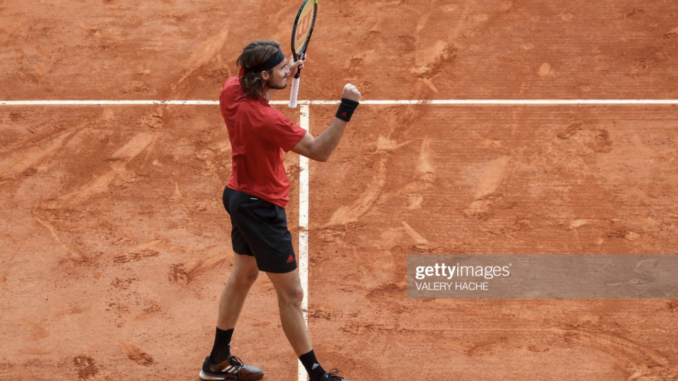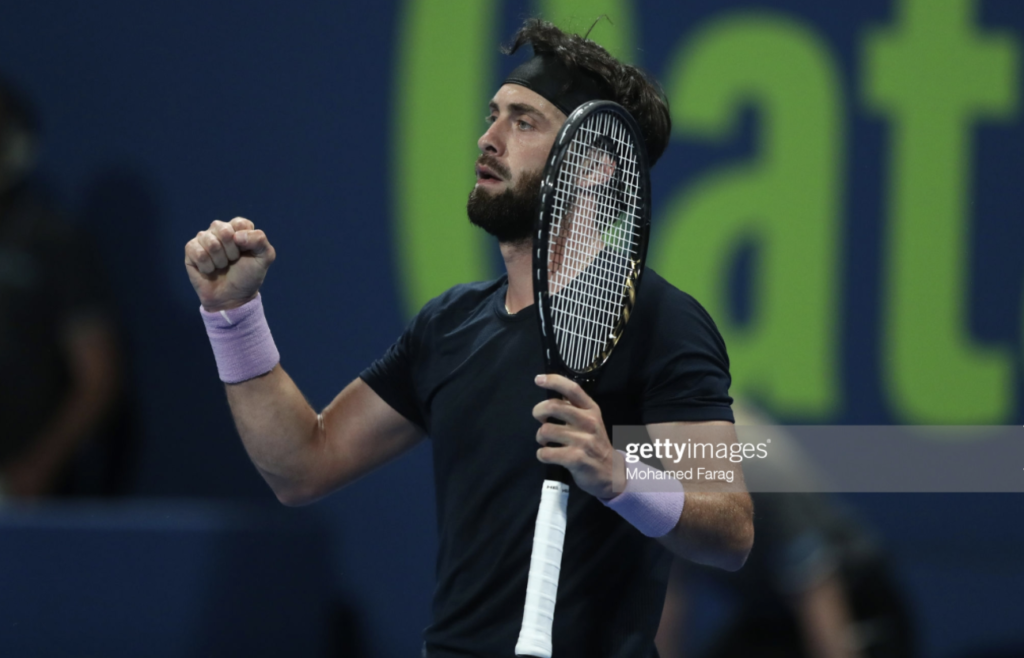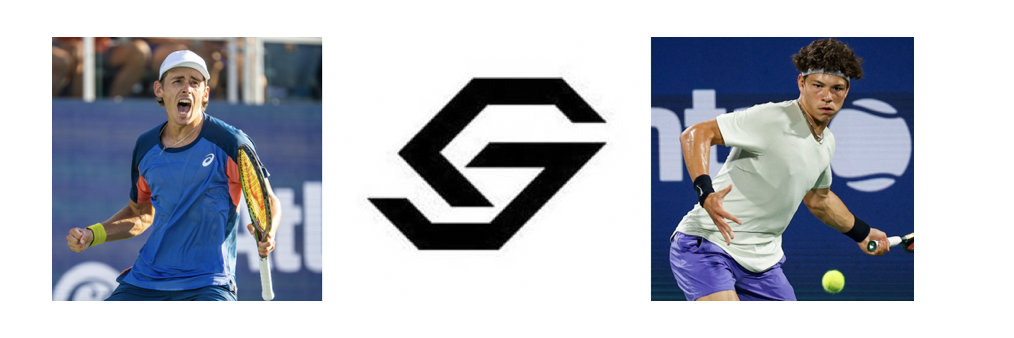
Stefanos Tsitsipas is the top seed in Hamburg and he will headline quarterfinal action when he goes up against Filip Krajinovic on Friday. Nikoloz Basilashvili and Laslo Djere are also bidding for a place in the last four.
(1) Stefanos Tsitsipas vs. (6) Filip Krajinovic
Tsitsipas and Krajinovic will be going head-to-head for the third time in their careers when they clash in the quarterfinals of the Hamburg European Open on Friday afternoon. Both of their previous encounters have gone Tsitsipas’ way, but it has never been easy for the Greek. He prevailed 7-5, 6-3, 6-7(5), 7-6(6) at the 2019 French Open before getting the job done 3-6, 6-4, 6-4 later that season on the indoor hard courts of Basel.
It is safe to say that this one probably won’t be as competitive. Krajinovic has already played six sets in victories over Daniel Altmaier and Philipp Kohlschreiber, and those were his first wins since round one of the French Open. The 44th-ranked Serb is still just 3-6 in his last nine matches. Tsitsipas lost right away at Wimbledon to Frances Tiafoe, but a return to clay should be just what the doctor ordered. The Roland Garros runner-up opened with a 7-6(2), 6-3 defeat of an in-form Dominik Koepfer on Wednesday. All signs point to a routine day at the office for Tsitsipas.
Pick: Tsitsipas in 2
(3) Nikoloz Basilashvili vs. Laslo Djere
Basilashvili has advanced to the quarterfinals without even playing a single match. The 29th-ranked Georgian earned a first-round bye as the No. 3 seed and then got a walkover from Sebastian Baez. It’s not like Basilashvili needs any help in Hamburg. He is 10-2 lifetime at this event with back-to-back titles in 2018 and 2019.

At the same time, Basilashvili has also lost his opening match twice in Hamburg. In four lifetime appearances, it has been all or nothing for him; either he loses his first match or wins the entire tournament. An immediate exit–albeit in the quarters–could be in store this time around, just at it was in 2020. That’s because Djere is up first and the clay-court specialist from Serbia leads the head-to-head series 3-1 (all on clay). They most recently faced each other this spring in Cagliari, where Djere dominated 6-2, 6-0. The world No. 57 already has two matches under his belt this week, having taken out Jan-Lennard Struff and Thiago Seyboth Wild in straight sets. This has all the makings of what would only be an upset according to ranking and seed.
Pick: Djere in 3


WWW?
It’s 2021 and the tennis tournaments schedule represent a mystery to me. Why not distribute the different surface types so there is enough space between them? Playing clay now after the clay-grass season? Why not separate them in 4 Quarters well defined? Also, the 2 weeks between RG and Wimby is too short. Doesn’t make short. Same refers to the number of tourneys on each surface. Just doesn’t make sense.
You’re making the assumption that there’s actually someone in charge of the tennis year. The slams are run by their country’s tennis federation, supposedly under the control (a fairly loose control) of the International Tennis Federation. They are run for the benefit of that country’s tennis federation, so France, England, Australia and the US get all the goodies ($$$) from them because back in the Dark Ages those countries won an early Davis Cup. Then there’s the ATP and WTA tours. They sanction events in response to proposals from entrepreneurs. Some of these entrepreneurs are actually a country’s tennis federation, for instance Canada (Rogers Cup aka Canada Open) and Italy (Rome aka Italian Open). Some of these tournaments have very long histories, like Monte Carlo. They have traditional times of the year and/or preferred surfaces. So you get a “golden swing” on clay in SA in February then March in Mexico, recently converted from clay. to lead into Calif and Florida (hard court). Then over to Europe for the long clay run up to RG, clay being the Euro traditional surface. I assume RG is when it is because of the warmer weather by late May-early June. Wimbledon is when it is because it’s on grass and England has a very short – and not all that suitable window for grass. Then we have a few “leftover” clay tournaments. Hamburg used to be in the spot Rome now occupies but the ATP reduced its status from Masters to 500 on account of its stadium not accommodating large enough crowds for a Masters and it lost its “spot” in the calendar. Grass was once the major tennis surface – and not all that long ago – featured by three of the four slams. But the USO moved from Queens to Flushing Meadows and decided that grass was too difficult (ie expensive) to maintain so they first flirted with an American “clay” surface then settled on the new fangled hard court (TENNIS WAS NEVER originally played on CEMENT for god’s sake. No sport is, except possibly for basketball in NYC playgrounds). The unpopular Australian Open moved its date from last tournament of the year to the first tournament (very smart move) and changed its surface to hard court. Bye bye grass. Except for Wimbledon which stuck to its roots, being British and all that. So, really, blame the slams for why tennis is so weird. And nature, I guess.
Very interesting history, thank you, Ramara.
Wow! That was a lot of information about his this sport is run. Who knew? I didn’t.
Rafa knows, for one.
Tsitsipas 2-0
Djere 2-0 (maybe 2-1)
Tpas in 2….Djere in 2.
Tsistipas is very fragile after that RG defeat. Pretty sure he’s seeing Djokovic at the other end of he court right now and Krajinovic is seeing a player that Djokovic came back easily against.
https://www.eurosport.com/tennis/wimbledon/2021/tennis-news-two-wimbledon-matches-under-investigation-for-match-fixing-after-irregular-bets_sto8418171/story.shtml
How hungry is Benoit Paire; out of where this guy is playing like his life depends on it.
‘nowhere’
I skip reading all anonymous posts.
Bravo! So do I!
Me too